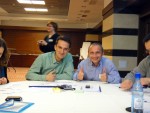Tomorrow is the first big test of my course. I’m in my hotel room in…
Agile Management Workshop
Agile Management is the missing ingredient to complement Agile development. Self-organizing teams need managers to be Agile too! This workshop teaches them how.
Yesterday was an important day. At the Scrum Gathering in Amsterdam I organized the first session of my 2-day Agile Management workshop. And it went as well as I could hope for.
Workshop
43 people participated in 5 exercises (about 30 minutes each), and each of the exercises was preceded by a small presentation (of about 10 minutes). People told me that they most enjoyed the “Delegation Poker Game,” where players get to decide how far they dare to go when delegating authority to a team.
Feedback
 After every exercise I asked people to evaluate it with sticky notes. At the end of the workshop I had an entire wall full of colorful feedback. There were smiley faces and thumbs-up among them, but also great comments that I will use to further improve and expand the workshop.
After every exercise I asked people to evaluate it with sticky notes. At the end of the workshop I had an entire wall full of colorful feedback. There were smiley faces and thumbs-up among them, but also great comments that I will use to further improve and expand the workshop.
Planning
My Agile Management course is still in development. The session at the Scrum Gathering was the first limited try-out. I expect the full Agile Management course will be ready in January. And I’m happy to announce that no less than 10 workshops have already been planned in six European countries, all of them scheduled by various professional training partners.
Topics
The topics that were addressed in today’s workshop at the Scrum Gathering together form about 40% of the final course. They included…
 Complexity Thinking: Acknowledge that software development teams are complex adaptive systems, in terms of predictability and planning, and recognize problems arising from complexity.
Complexity Thinking: Acknowledge that software development teams are complex adaptive systems, in terms of predictability and planning, and recognize problems arising from complexity.
 The 10 Intrinsic Desires: Understand which intrinsic desires drive the behavior of employees, and use that information to discover a mismatch between people’s intrinsic desires and corporate management systems.
The 10 Intrinsic Desires: Understand which intrinsic desires drive the behavior of employees, and use that information to discover a mismatch between people’s intrinsic desires and corporate management systems.
 The Delegation Game: Use the seven levels of authority to delegate responsibilities to people, and develop intuition in determining what authority levels there are, and how to use them in which situations.
The Delegation Game: Use the seven levels of authority to delegate responsibilities to people, and develop intuition in determining what authority levels there are, and how to use them in which situations.
 Agile Goal Setting: Understand how goal setting in an agile environment is different from traditional goal setting, and use that knowledge to define context-dependent goals according to different criteria.
Agile Goal Setting: Understand how goal setting in an agile environment is different from traditional goal setting, and use that knowledge to define context-dependent goals according to different criteria.
 Competence Development: Understand the different options a manager has in order to develop competence in a team or organization, and apply these options in different strategies to tackle competency problems.
Competence Development: Understand the different options a manager has in order to develop competence in a team or organization, and apply these options in different strategies to tackle competency problems.
 The Value Network Game: Understand that organizations perform best when they are grown and managed as networks, and draw organizations not as static hierarchies but as dynamic networks.
The Value Network Game: Understand that organizations perform best when they are grown and managed as networks, and draw organizations not as static hierarchies but as dynamic networks.
These six examples are the first of what will be a 2-day workshop of +/- 15 games and exercises. A large part of the course will be based on the Management 3.0 book. And yes… I plan to give participants a free copy of it!
Let me know if you’re interested…




